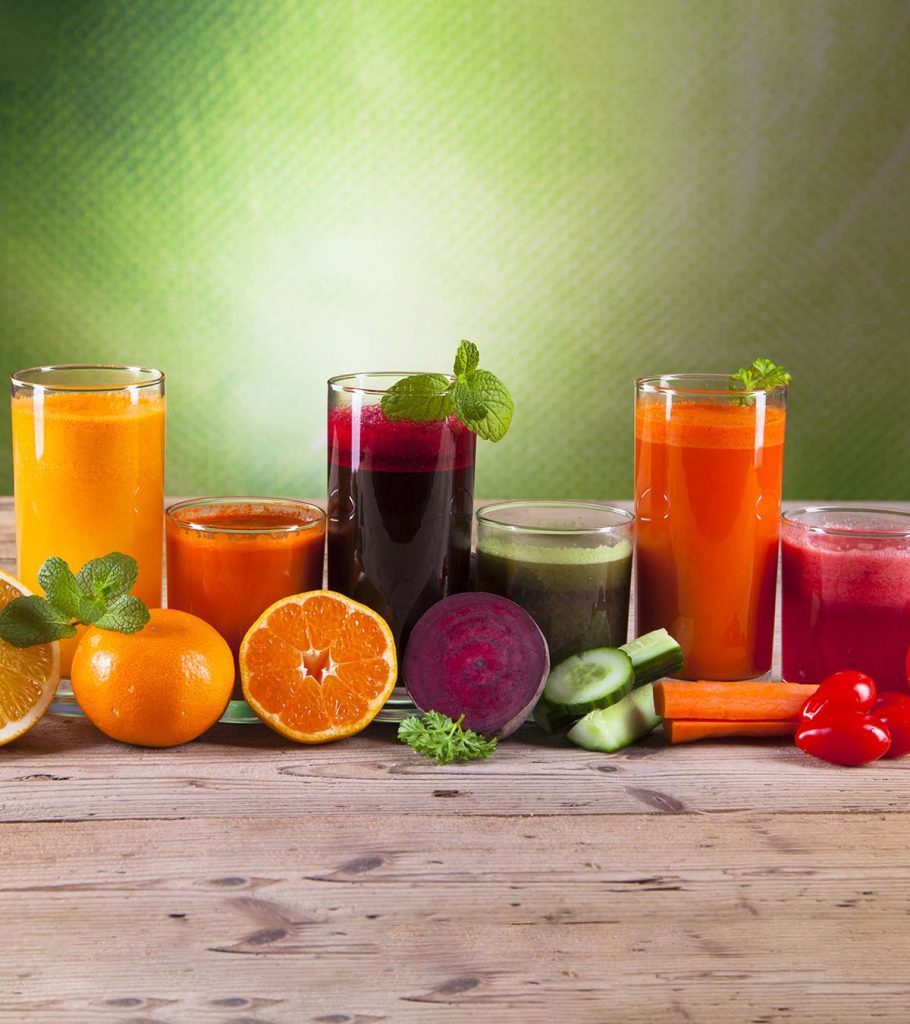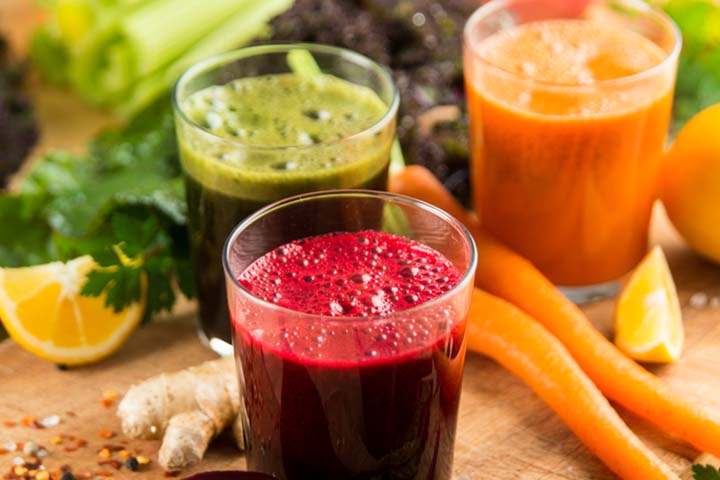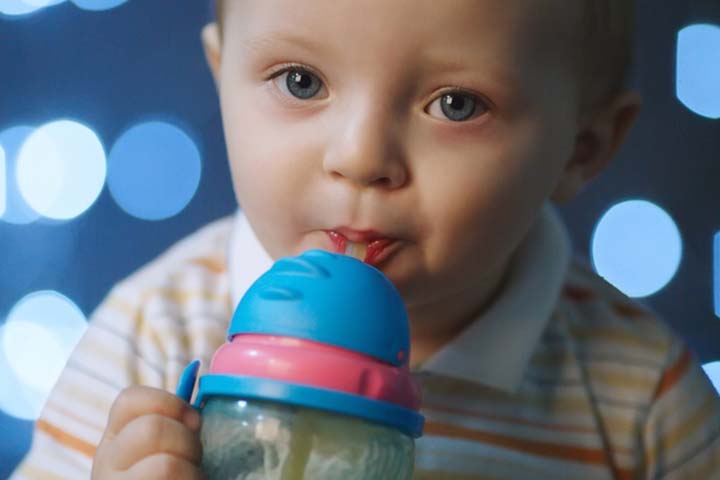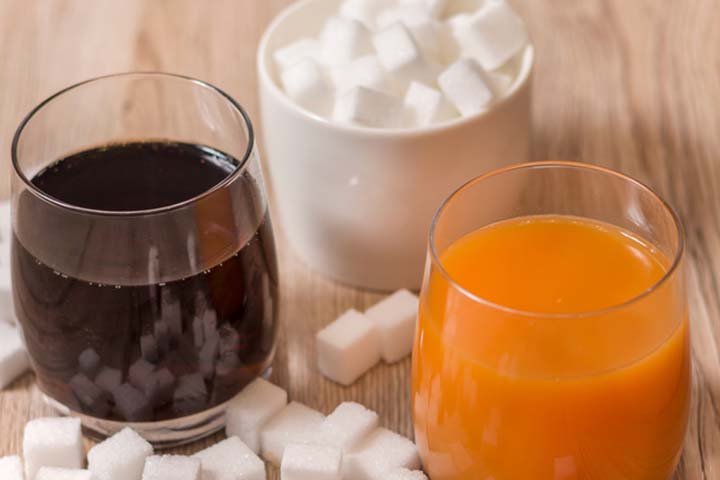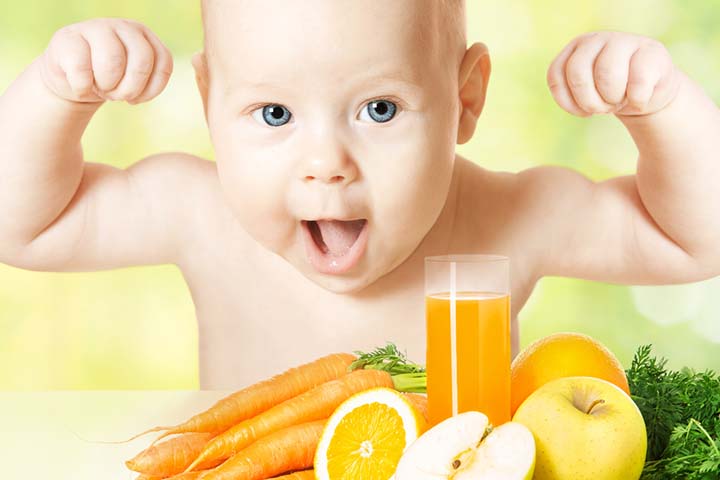Fruits and vegetable purees form the first foods for many babies. While parents want to ensure their babies get all the necessary nutrients and form healthy food habits, they may often wonder if and when to introduce fruit and vegetable juices for babies. Is it safe to give juices to babies? Moreover, juices available in the market may not be safe due to their high sugar content. Based on data from the Centers for Disease Control and Prevention, in 2021, around 57.1% of children aged one to five consumed a sugary drink at least once a week. Introducing homemade juices to their diets could be a beneficial approach to tackle this concern. So, read this post to know the ideal quantity, health benefits, possible side effects, and more about fruit juices for babies.
What Is Juice?
The US Food and Drug Administration (USFDA) labels a product as “juice” only if it is 100% juice, i.e., the pulp included. For juices made from concentrate, the label must mention that the product is reconstituted from concentrate. In general, commercial juices contain between 10-99% juice, added sweeteners, varied flavors, and fortifiers such as vitamin C or calcium. These ingredients must be listed on the label as per the regulations (1).
Are Fruit And Vegetable Juices Good for Babies?
Ideally, we should avoid juices for babies under one year of age as they have very low to no nutrition and increase the risk of tooth decay (2). For babies above one year, juices could have similar health benefits as those for adults. Juices could provide certain health benefits provided the juices are fed in moderation and are a part of the baby’s balanced diet.
You may try stewed apple, grape, muskmelon, watermelon, carrot, orange, tomato, sweet lime, pear, peach, mango, berries, lychee, beetroot, kale, lemon, watercress.
Benefits of Fruit and Vegetable Juices
The following are some key benefits of fruit and vegetable juices for babies:
- Source of micronutrients: Fruit and vegetable juices can be a source of micronutrients, namely minerals and vitamins. These multivitamins and minerals help in the healthy growth and development of the baby.
- Healthy blood circulation: Fruit and vegetable juices are believed to affect cardiovascular health. Juice may help lower blood pressure and improve blood lipid profiles (3). It occurs because juices contain a variety of polyphenols, vitamins, and minerals.
- Prevention of inflammation: Fruit and vegetable juices have compounds that can help reduce inflammation. It can have a role in the general well-being of the baby.
- Prebiotic effect: Vegetable and fruit juices have bioactive compounds like polyphenols, oligosaccharides, fiber and nitrate. In the human gut, these compounds may induce a prebiotic-like effect (4). The prebiotics work as food for the gut microbes. Healthy gut microbes can help improve the overall health of the digestive system.
All these benefits can also be achieved by encouraging your baby to eat lots of different fruits and vegetables, mashed, pureed or finger foods.
When Can Your Baby Start Drinking Juice?
The American Academy of Pediatrics recommends against giving juice to infants under 12 months of age, as it does not provide any added nutritional benefits or nourishment. After 12 months of age, infants may have controlled amounts of juice occasionally but whole foods are a better option.
How Much Juice Can You Give Your Baby?
For babies above 12 months of age, juice can be introduced in the diet into diluted form, one part juice in 10 parts of water to minimize the risk of tooth decay. Also, limit the intake to no more than 60-120ml a day (5).
Can Juices Be Harmful To Babies?
There are no serious side effects of fruit and vegetable juices, but they could pose some health issues (1):
- Juices, especially fruit juices, are considered high in their overall sugar content and this content increases further if the juices have added sugar too. This might contribute to increased calorie consumption.
- Increased calorie consumption might lead to increased weight gain.
- Juices pose a risk of dental caries, especially in babies and young children.
- They lack fiber, which is essential for various body functions.
- As the juices, especially fruit juices, are sweet, babies and young children might develop a taste for them and refuse other food groups.
- Juices made commercially could have added sweeteners, flavors, additives and preservatives which are not ideal for babies and young children.
The juices that you feed the baby should be pasteurized (6). Unpasteurized juices could contain harmful bacteria, which might be detrimental to the baby’s health.
Are Homemade Juices Safe?
Homemade juice is fresh, hygienic, and completely natural. Additionally, it is customizable. However, it needs sterilization through pasteurization or boiling.
Adults do not require pasteurized or boiled juice because their immune systems can handle the bacteria. But, the US FDA recommends that the juice be boiled to eliminate all bacteria before feeding it to a toddler (7). So, you should squeeze or extract the juice and pasteurize it before feeding it to your child.
Tips For Feeding Fruit Juices To Babies
The following points can be helpful when you plan to introduce fruit juices to a baby (8):
- Use a cup or spoon to feed the juice as feeding it in the bottle might lead to overconsumption.
- Begin with only 2-3 spoons of juice so that the baby may get used to the taste of juices.
- Give 100% concentrated juice rather than juice drinks or powder mixes, which are sweetened. Also, to ease the digestion of concentrated juice, dilute it with boiled and cooled water.
- Do not replace the meals with fruit juices. Instead, let juices be an accompaniment with the balanced meals.
- Begin with vegetable juice rather than fruit juice because babies tend to prefer fruit juices because of their sweet taste and may develop a dislike for vegetable juices.
- Avoid adding extra salt, sugar, honey, or any other condiments to the juice as it might be difficult for your baby to digest.
- You can begin with a single vegetable or single fruit juice and then gradually combine a few fruits or vegetables.
- Do not give fruit juice around bedtime as it might cause digestive issues like bloating, gas, and indigestion in babies.
- Juices should not be used for the treatment of dehydration or diarrhea.
Note: If you are giving a vegetable or fruit juice for the first time, notice for any signs of allergy.
Fruit and vegetable juices for babies are not ideal since they lack many nutrients and often cause tooth decay. Hence, providing fruit and vegetable blends or purees for babies to get the fibers and other nutrients is recommended. You may include juices in a baby’s diet. But whole foods are best to promote digestive and general health. Juices can also increase calorie consumption and weight gain. Sometimes you may give homemade juices and avoid commercial juices with artificial sweeteners and flavors. Pasteurizing the juices for babies is also recommended to protect them from bacterial infections.
Key Pointers
- Babies over one year old can have diluted fruit and vegetable juices in moderation.
- Fruit and vegetable juices provide several health benefits, including multivitamins for healthy growth, preventing inflammation, and aiding digestion.
- Drinking fruit and vegetable juices may increase the risk of dental caries, being overweight, and exposure to additives and preservatives.
- Pasteurized, homemade juices are a healthier alternative to store-bought juices.
- Serve juices as a side dish with balanced meals, and avoid giving them at bedtime, as they can lead to gas and bloating.
Wondering whether you can feed juice to your baby? Find out in this video! Learn when it’s safe to introduce juice to your baby’s diet and how to do it properly.
